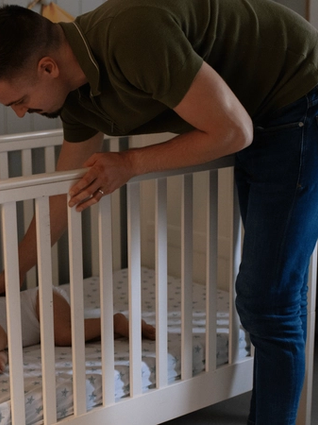
- Home
- Tools And Resources
- Baby Development Calendar
- 17–18 Weeks Old Baby | Growth & Weaning Signs
17-18-weeks-old baby
2 min
Babies at this age…
- Grow more than a centimetre a month!
- May be able to hold and even pick up larger objects
- By 4-5 months, most babies will have doubled their birthweight
Your baby
- Reading to your baby is a great way to encourage a love of books – even though they don't yet have any clue what the words mean!
- Giving your baby different types and textures of objects and toys to chew and explore - soft, hard, furry, noisy – will stimulate the senses
- It's fine to take your baby swimming - the Department of Health says there’s no need to wait for babies to have all their immunisations first
From Moses basket to cot
At around this age, your baby is probably ready to make the transition from a Moses basket or crib to a cot! This can be a little daunting for your baby at first because they will be surrounded by a lot more space than they're used to. If you are using a Moses basket, try placing it in the cot for a few nights so that your baby can get used to the new surroundings - once your baby seems settled, you can remove the basket and just use the cot.
Baby sleeping bags can also help your baby feel a little more secure. When you put your baby down to sleep, the best position is on their back with their feet close to the foot of the cot.
Our website has more information on safe sleeping, or you can visit the Lullaby Trust website.
Considering your childcare options
You may not be going back to work for a few more months, but the time goes quickly, and it's never too early to begin considering what childcare option is best for you. The PACEY website has lots of information on choosing a childminder, plus a great list of registered childminders and nannies in your area.
Thinking about weaning?
Most doctors and health visitors recommend weaning at 6 months, but some babies are ready before this. If you think your baby is ready to start, have a chat with your health visitor for advice. Signs of readiness include:
- Your baby can sit up well with support and hold his or her head steady
- Your baby is showing an interest in your food and can pick up a piece of food (or a toy) and get it to his or her mouth
- Your baby can swallow a tiny bit of puree instead of pushing it back out with his or her tongue
You can download the HiPP weaning chart, a step-by-step guide to the first four weeks of weaning.
